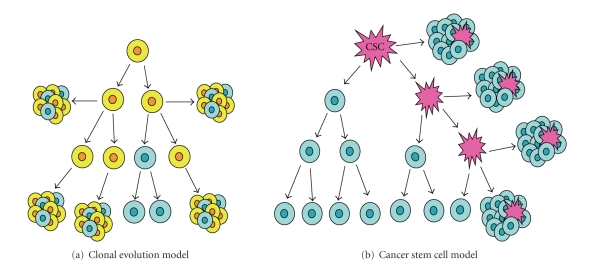Figure 1.
Models of heterogeneity in solid cancer cells. (a) The clonal evolution model assumes that every cell in a tumor is potentially tumor-initiating. Progression is governed by rare stochastic events operating in all cells. Cells with mutations (yellow) that acquire growth advantage will dominate over all other cells in the tumor and will originate a new clone containing cells characterized by a different phenotype and having different proliferative potentials; in a clonogenicity or tumorigenicity assay, some of these cells (blue) would have a low probability of exhibiting this potential. (b) The cancer stem cell model states that a particular subset of tumor cells with stem cell-like properties, called “cancer stem cell” (CSC) (pink), drives tumor initiation, progression, and recurrence. CSCs are able to self-renew indefinitely and to differentiate, leading to the production of all cell types (blue) that make up the rest of the tumor. In clonogenic assays, CSCs have the potential to proliferate extensively and can form new tumors on transplantation.

